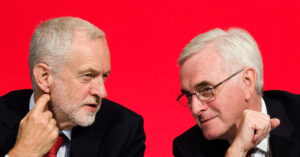Henry Kissinger memorably observed that the reason academic fights were so vicious was that the prizes were so small. So it has been in the Labour Party for most of the last 13 years, when the chances of overturning the Conservative administrations of the day were so unlikely that Labour MPs could focus on their real enemies — each other.
But slowly and decisively, silence has fallen on the Labour Party ahead of a purported reshuffle. Within its ranks, there seems to be a dogged determination to win. Unity of will doesn’t guarantee anything in a general election, but its opposite, disunity, is political death — as backbench Tory MPs are likely to see in the coming by-elections.
Of course, political energy has to go somewhere, and with Labour looking increasingly likely to be at least the largest party in the Commons after the next election, all the spinning is going into self-promotion to secure, or retain, a post in Keir Starmer’s Shadow Cabinet. With a Labour opinion-poll lead over the Tories that in recent weeks has been between 16 and 25 points, it would be a “Golden Ticket”.
Hence the flurry of earnest speculation about which senior Labour figures could be sacked or sidelined in the coming weeks. When political editors are asked, “So, what is Keir Starmer going to do?”, the only honest answer is: “Nobody knows.” For, in contrast to most other modern Labour leaders, Starmer does not provide a running commentary to the Westminster Lobby; nor does he have a newspaper columnist who serves as “court reporter”. Starmer stays silent, acts and then moves on.
Will there be a reshuffle? We don’t know. Should there be one? Absolutely. This is the last sensible moment before the election — it’s now or never.
There are clear rules Starmer should follow. First, a reshuffle must have a clear political purpose — or don’t do it. This is not a technical matter; it’s a demonstration of leadership. Previous reshuffles have reflected Starmer’s relative strength as leader, needing to balance factions in both the Parliamentary Labour Party and the movement as a whole. It is, after all, less than two years since the UK’s Covid “Freedom Day”, when it seemed as though Boris Johnson would carry politics before him for the rest of the decade. Yet Starmer is now on his third prime minister. There have been so many Tory reshuffles and departmental reorganisations since the 2019 general election that Labour’s Shadow Cabinet no longer “shadows” the government.
Given this Conservative chaos, it would be pointless for Labour to precisely match the current machinery of government. What Starmer needs is to show who would be sitting around the Cabinet table if he were to win the next election — and they need to be ready in post immediately. The sooner the reshuffle is done, the longer the new team will have to read into their brief, and to prepare for their autumn speeches. This October’s Labour Party conference is likely to be the last one before the general election, so it is the best chance to showcase a government-in-waiting. Specific policies can wait, but personalities show intent.
Second, Starmer should reward performance and sideline those who haven’t made the grade; this is no time for passengers. The benefit of presiding over a predicted landslide is that it yields absolute authority for the leader. Such moments are rare in politics, and Starmer should seize his and clear out the Shadow Cabinet.
First, he must shrink it to 22, the size of the actual Cabinet. Rampant “shadflation” means that 30 politicians are currently in the Shadow Cabinet, a size created by the evasion of hard choices. It’s time to make them. There is no longer a Department for International Development, and Starmer should be clear it isn’t coming back. The incumbent Shadow Minister, Preet Gill should, therefore, be the first to go.
The fashion, created by David Cameron, of “ministers attending Cabinet”, without being members of Cabinet, should be avoided. You are either in or out; there can be no halfway house. Which will leave up to six of Starmer’s frontbench out of a job.
This slimming-down will help with some of the politics, too. It is visible from the Moon that Dr Rosena Allin-Khan, Shadow Minister for Minister for Mental Health, disagrees with her boss, Wes Streeting, about health policy. As he is one of the strongest of Labour’s frontbench performers, he isn’t moving. So Rosena has to go.
Elsewhere, there are easier decisions for Starmer to make, such as keeping the strong performers where they are: Rachel Reeves, David Lammy and Yvette Cooper. In the wider ranks, John Healey has made Defence his own – his embrace of Nato has eliminated memories of the Corbyn years; Jim McMahon has been instrumental in making the politics of the water industry a vote-winner; and Shadow Leader of the House, Thangam Debbonaire, has become the quintessential (and essential) “Minister for the Today Programme”. Ed Miliband has earned his place be doing the rarest of things: becoming the ex-leader you actually want in your team because his government experience and credentials are a useful bridge to young and green voters.
But not all should have prizes. To promote talent, vacancies must be created, and politics should drive that, too. AI is transforming everything — but what has Labour had to say about this revolutionary moment? The debate ought to be driven by the Shadow Secretary of State for DCMS, but it hasn’t been — so Lucy Powell has to make way for a new appointment.
Similarly, when the justice system is in freefall and undermining public trust in law and order, the last thing Labour needs is a Shadow Justice Secretary trying to ramp up the Government’s ridiculous war on drugs. Steve Reed should be replaced by a politician who can consistently keep in voters’ minds the crisis in the Courts that undermines law enforcement. And amid a poverty crisis caused by the combination of cost-of-living pressures and cruel welfare policies, Labour needs a crusader, not a technician — so Jonathan Ashworth should make way for someone new. While all three are talented politicians, in opposition, it is “Shadow Cabinet or bust”.
That still leaves what one might call the “Prescott challenge” — how to properly use the huge talents of a deputy leader who is a superb politician and the perfect counterpoint to the party leader. It is absurd to believe that Angela Rayner should merely be Chancellor of the Duchy of Lancaster — but the uneasy settlement of the last reshuffle, which left her holding down a sheaf of Shadow Ministerial posts, cannot last into government. Creating a mega-department for John Prescott wasn’t the right answer in 1997, and should be avoided this time round. Rayner’s radicalism, rooted equally in her working-class background and her Left-wing politics, would bring real edge to the Justice Department, or the Work and Pensions brief.
But it will surely need to be resolved privately between Angela and Keir, in a modern-day equivalent of the 1994 Granita deal, struck in an Islington restaurant, which formalised the working relationship between Blair and Brown.
Third, promote talent. New faces and new voices will bring new energy and get cut-through. When voters say that they don’t know what Labour stands for, they don’t want hundreds more pages of policy documents, they want definition. Given the state of the economy and the public finances — as well as Shadow Chief Secretary Pat McFadden’s tight control over spending commitments — Labour can’t spend its way into the public mind. It needs to think its way there instead.
The two most creative thinkers on the wider shadow frontbench are Liz Kendall and Alison McGovern. Kendall is perhaps best-remembered for her 2015 leadership bid, in which she was beaten into fourth place of four — but she also set the terms for the politics that have catapulted Labour to its current poll lead. When Kendall said “country first, party second”, it cost her the votes of the Left-leaning Labour membership, but it helped her frame the core tenets of Starmerism. And as Shadow Social Care Minister, she has avoided the siren call of expensive and pointless nationalising in favour of a focus on raising standards and investing in the workforce.
Alison McGovern, meanwhile, has played an equally significant role in making Labour electable again. As chair of the centre-left political faction and think-tank Progress (now Progressive Britain), she shepherded moderate policies, politics and activists through the Corbyn years so that there was a reserve army to support Starmer when elected leader. As the Shadow Minister for Employment, she has a track record of innovative thinking: her most recent plan, to devolve job centres to local councils, would prove more effective than the status quo without costing more.
Finally, reshuffles are about two types of people. The first are your MPs — and when I say it pays to remember them, I mean that literally. There was a reshuffle during my time at No. 10 when a minister lost their job because their name was on a piece of paper that had fallen off the table and someone else’s was slotted in its place. The reality is that a reshuffle is rarely only one move; you must have the whole plan in full detail before you announce the headline parts. Nobody must be forgotten.
The second group of people are, of course, the voters. If Labour’s reshuffle is done right, the public will take notice of the new faces on the frontbench. Once he has his best team in place, the next challenge for Starmer will be sending them around the country to promote the party’s pledges and policies. Politics is a retail business, and sales are best done face to face — but you don’t need to wait for a general election to seal the deal with the British people.
Disclaimer
Some of the posts we share are controversial and we do not necessarily agree with them in the whole extend. Sometimes we agree with the content or part of it but we do not agree with the narration or language. Nevertheless we find them somehow interesting, valuable and/or informative or we share them, because we strongly believe in freedom of speech, free press and journalism. We strongly encourage you to have a critical approach to all the content, do your own research and analysis to build your own opinion.
We would be glad to have your feedback.
Source: UnHerd Read the original article here: https://unherd.com/




